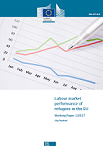Dellis, Konstantinos, Sondermann, David, Vansteenkiste, Isabel, (2017), “Determinants of FDI inflows in advanced economies: Does the quality of economic structures matter?”, ECB Working Paper Series No 2066, Mάιος This paper investigates the role of economic structures as determinants of FDI inflows. We expand on the existing literature by focusing on advanced economies, using a newly available measure of FDI which cleans the data from statistical artefacts, such as financial round tripping, …Read More
The importance of being special: repo markets during the crisis
Corradin, Stefano, Maddaloni, Angela, (2017), “The importance of being special: repo markets during the crisis”, ECB, Μάιος 2017 Specialness – the premium of procuring a specific security in the repo market – increased in the second half of 2011 for Italian government bonds. We assess the impact on specialness of the outright purchase program of the Eurosystem during the same period. Bonds bought by the Eurosystem had higher specialness. The impact was …Read More
Does employment protection legislation affect credit access? Evidence from Europe
Moro, Andrea, Maresch, Daniela, Ferrando, Annalisa, Udell, Gregory F., (2017), “Does employment protection legislation affect credit access? Evidence from Europe”, ECB, Μάιος We investigate the impact of employment protection on firms’ credit access by looking at both credit obtained from banks and firms’ decision to apply for a loan. We find that greater flexibility in structuring the employees’ working hours and in dismissing employees increases the probability that firms obtain …Read More
What could a euro-area finance minister mean?
Wolff, Guntram B., (2017), “What could a euro-area finance minister mean?”, Bruegel, 17 Μαΐου With the election of Emmanuel Macron as president of France, the idea of a euro-area treasury and finance minister is back in the limelight. The election programme of Emmanuel Macron calls for “a budget for the euro area voted by a euro-area parliament and executed by a euro-area finance minister” with the aim to “be able to …Read More
Labour market performance of refugees in the EU
Peschner, Jörg, (2017), “Labour market performance of refugees in the EU”, Working Paper 1/2017, European Commission, Directorate-General for Employment, Social Affairs and Inclusion, 5 Μαϊου This paper analyses the individual and socio-demographic factors behind the low employment rate of refugees compared to individuals born in the EU but also compared to other migrants. It complements the 2016 Employment and Social Developments Review where a chapter was dedicated to the labour …Read More
Bank Solvency and Funding Cost : New Data and New Results
Valderrama,, Laura, Sigmund, Michael, Schmitz, Stefan W., (2017), “Bank Solvency and Funding Cost : New Data and New Results”, IMF, 15 Μαΐου This paper presents new evidence on the empirical relationship between bank solvency and funding costs. Building on a newly constructed dataset drawing on supervisory data for 54 large banks from six advanced countries over 2004–2013, we use a simultaneous equation approach to estimate the contemporaneous interaction between solvency and …Read More
Germany Will Lose if Macron Fails
Kotz, Hans-Helmut, (2017), “Germany Will Lose if Macron Fails”, Project Syndicate, 15 Μαΐου FRANKFURT – When Emmanuel Macron won the French presidential election, many Germans breathed a loud sigh of relief. A pro-European centrist had soundly defeated a far-right populist, the National Front’s Marine Le Pen. But if the nationalist threat to Europe is truly to be contained, Germany will have to work with Macron to address the economic challenges that …Read More
The Global Crisis watershed: Investment-less credit booms
Ohnsorge, Franziska, Yu, Shu, (2017), “The Global Crisis watershed: Investment-less credit booms”, Vox Eu, 16 Μαΐου Credit booms have often financed rapid investment growth, with investment subsequently stalling (Mendoza and Terrones 2012, Gorton and Ordonez 2016). However, after the Global Crisis, the nature of the relationship between credit and investment has changed. Specifically, credit to the nonfinancial private sector has risen rapidly in several several emerging market and developing economies (EMDEs), …Read More
What we can learn from euro-dollar tweets
Gholampour, Vahid, Wincoop, Eric van, (2017), “What we can learn from euro-dollar tweets”, Vox Eu, 15 Μαΐου 2017 Research on the microstructure of foreign exchange (FX) has established the importance of private information for the determination of exchange rates. But private information is, by definition, unobservable. In social media, large numbers of people directly express their opinions about the direction of asset prices. Other studies, such as Antweiler and Frank (2004) and …Read More
The Eurosystem collateral framework explained
Bindseil, Ulrich, Corsi, Marco, Sahel, Benjamin, Visser, Ad, (2017), “The Eurosystem collateral framework explained”, ECB Occasional Paper Series No 189, Μάιος The Eurosystem collateral framework (ESCF) has played a key role in the ECB monetary policy implementation since 1999. Moreover, the financial and sovereign debt crisis and with it the increased reliance of banks on central bank credit have underlined the importance of central bank collateral frameworks. Broad collateral frameworks have …Read More





